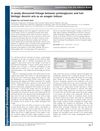44 citations,
June 2017 in “The EMBO Journal” LPA3 signaling in the uterus is crucial for placental formation and fetal development.
[object Object] 57 citations,
April 2009 in “Differentiation” SDF-1/CXCL12 and its receptor CXCR4 are crucial for melanocyte movement in mouse hair follicles.
488 citations,
July 2021 in “Cell” Fibroblasts are crucial for tissue repair and inflammation, and understanding them can help treat fibrotic diseases.
 6 citations,
February 2023 in “Journal of nanobiotechnology”
6 citations,
February 2023 in “Journal of nanobiotechnology” The new anti-acne treatment HA-P5 effectively reduces acne by targeting two key receptors and avoids an enzyme that can hinder treatment.
 June 2020 in “Journal of Investigative Dermatology”
June 2020 in “Journal of Investigative Dermatology” The technique effectively shows how human skin and hair cells form into ball-like structures.
 14 citations,
August 2018 in “Frontiers in Cellular and Infection Microbiology”
14 citations,
August 2018 in “Frontiers in Cellular and Infection Microbiology” Dengue virus can infect human hair follicle cells and may cause hair loss.
 211 citations,
October 2001 in “The FASEB Journal”
211 citations,
October 2001 in “The FASEB Journal” Noggin is necessary to start the hair growth phase in skin after birth.
 35 citations,
March 2005 in “Journal of Investigative Dermatology”
35 citations,
March 2005 in “Journal of Investigative Dermatology” Potassium channel openers like minoxidil help hair grow by acting on hair follicles.
 April 2018 in “The journal of investigative dermatology/Journal of investigative dermatology”
April 2018 in “The journal of investigative dermatology/Journal of investigative dermatology” Electrical epilation damages hair follicles and surrounding skin, likely preventing hair regrowth.
 220 citations,
March 2020 in “Advanced functional materials”
220 citations,
March 2020 in “Advanced functional materials” Biomaterials with MSC-derived substances could improve tissue repair and have advantages over direct cell therapy.
 10 citations,
May 2020 in “Dermatology Research and Practice”
10 citations,
May 2020 in “Dermatology Research and Practice” Proteoglycans are important for hair growth, and a specific treatment can help reduce hair loss.
 7 citations,
December 2020 in “Pharmaceutics”
7 citations,
December 2020 in “Pharmaceutics” A mix of tocopherol acetate and L-menthol helps grow hair better than using them separately or using minoxidil.
 45 citations,
September 1998 in “Journal of Investigative Dermatology”
45 citations,
September 1998 in “Journal of Investigative Dermatology” The enzyme 17β-HSD type 2 mainly performs oxidation in human sebaceous glands, which may help protect against acne.
 63 citations,
November 1999 in “British journal of dermatology/British journal of dermatology, Supplement”
63 citations,
November 1999 in “British journal of dermatology/British journal of dermatology, Supplement” Hair sensitivity to androgens is partly controlled by specific enzyme expressions in different hair areas.
 91 citations,
May 2003 in “American Journal of Pathology”
91 citations,
May 2003 in “American Journal of Pathology” Prolactin affects hair growth cycles and can cause early hair follicle regression.
[object Object]  47 citations,
October 2016 in “Molecular and Cellular Endocrinology”
47 citations,
October 2016 in “Molecular and Cellular Endocrinology” Androgens prevent hair growth by changing Wnt signals in cells.
 61 citations,
September 2010 in “Genomics”
61 citations,
September 2010 in “Genomics” The study found that immune responses disrupt hair growth cycles, causing hair loss in alopecia areata.
 23 citations,
March 1988 in “Biochemical Pharmacology”
23 citations,
March 1988 in “Biochemical Pharmacology” Minoxidil stops cells from making prostacyclin, which may help with hair growth. More research is needed.
 5 citations,
May 2020 in “Life science alliance”
5 citations,
May 2020 in “Life science alliance” Removing integrin α3β1 from hair stem cells lowers skin tumor growth by affecting CCN2 protein levels.

PlacMA hydrogels from human placenta are versatile and useful for cell culture and tissue engineering.
 86 citations,
October 2005 in “Experimental Dermatology”
86 citations,
October 2005 in “Experimental Dermatology” The Foxn1 gene mutation causes hairlessness and immune system issues, and understanding it could lead to hair growth disorder treatments.
 27 citations,
August 2005 in “The journal of investigative dermatology/Journal of investigative dermatology”
27 citations,
August 2005 in “The journal of investigative dermatology/Journal of investigative dermatology” Researchers found new genes involved in hair growth, which could help develop new hair treatments.
 10 citations,
August 2014 in “Experimental Dermatology”
10 citations,
August 2014 in “Experimental Dermatology” Decorin, a protein, may help start hair growth and could be used to treat hair loss.
 2 citations,
May 2017 in “InTech eBooks”
2 citations,
May 2017 in “InTech eBooks” Stem cells could improve hair growth and new treatments for baldness are being researched.
 December 2011 in “Asia-Pacific biotech news”
December 2011 in “Asia-Pacific biotech news” In 2011, there were major scientific breakthroughs in cancer treatment, immunity, Parkinson's, virus simulation, schizophrenia, hair growth, lung cancer, and medical grafts.
 499 citations,
September 2011 in “Cell”
499 citations,
September 2011 in “Cell” Fat-related cells are important for initiating hair growth.
 249 citations,
November 2003 in “Clinical endocrinology”
249 citations,
November 2003 in “Clinical endocrinology” Insulin resistance is a key factor in polycystic ovary syndrome, but genetics may also contribute.
 236 citations,
July 2001 in “Trends in Molecular Medicine”
236 citations,
July 2001 in “Trends in Molecular Medicine” Future hair loss treatments should aim to extend hair growth, reactivate resting follicles, reverse shrinkage, and possibly create new follicles, with gene therapy showing promise.
 99 citations,
December 2010 in “Journal of The European Academy of Dermatology and Venereology”
99 citations,
December 2010 in “Journal of The European Academy of Dermatology and Venereology” The document concludes that certain genetic mutations and dietary factors are involved in acne development, and treatments like isotretinoin and diet changes can help manage it.
 11 citations,
November 2012 in “Seminars in Cutaneous Medicine and Surgery”
11 citations,
November 2012 in “Seminars in Cutaneous Medicine and Surgery” Genetic factors affect hair loss, and molecular testing may help predict, diagnose, and treat it.


























